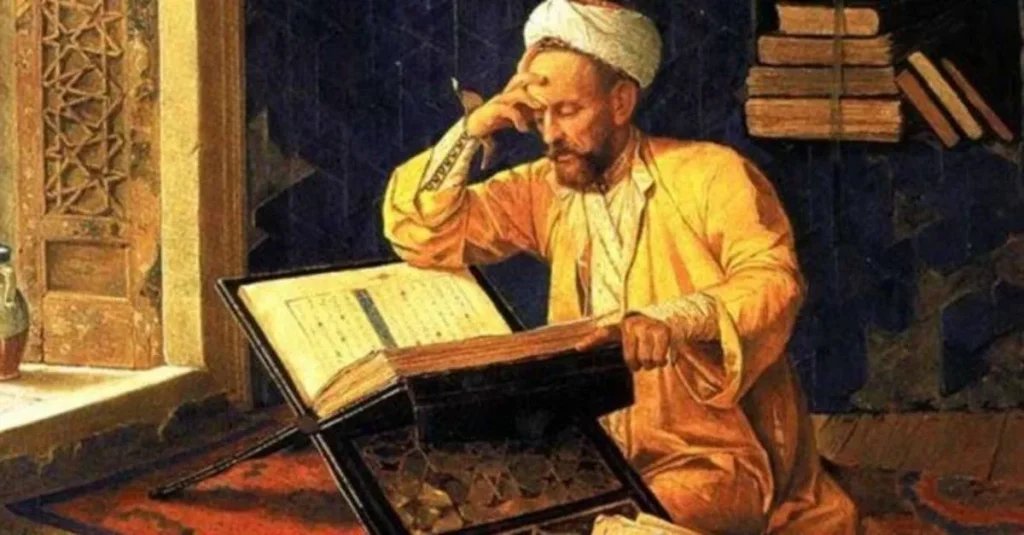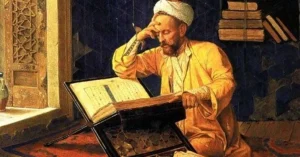
A of portrait of Imam Al-Ghazali
Spiritual and Moral Teachings in Ihya’
Imam Al-Ghazali (رحمه الله) emphasized the importance of inner purification alongside outward religious practice [1]. Spiritual growth is essential.
He taught that sincerity and intention give meaning to every action. Without these, rituals are incomplete [2].
Al-Ghazali highlighted the dangers of pride, greed, and envy. Self-reflection and discipline help overcome these vices [1].
He stressed patience, humility, and gratitude. These virtues strengthen character and nurture ethical behavior [3].
The work links knowledge with moral development. Intellectual understanding must guide ethical conduct and daily life [2].
Al-Ghazali also emphasized devotion and remembrance of God. Constant mindfulness refines both heart and mind [1].
Ethics and spirituality are interconnected. True knowledge transforms behavior, benefiting both the individual and society [3].
In essence, Ihya’ Ulum al-Din teaches balanced living. It integrates worship, morality, and personal refinement [2].
References:
- Al-Ghazali, Ihya’ Ulum al-Din, 11th century.
- Fakhry, Majid, A History of Islamic Philosophy, Columbia University Press, 2004.
- Hourani, George, Islamic Thought in the Classical Age, Cambridge University Press, 1983.
Political Life and Social Contributions
Imam Al-Ghazali (رحمه الله) was primarily a scholar, but he influenced political and social thought [1]. His counsel was valued.
He advised rulers on justice, ethics, and governance [2]. Al-Ghazali emphasized that leaders must uphold moral and religious principles [1].
His writings addressed corruption and misuse of power. He encouraged fairness, honesty, and accountability [3]. Leaders should serve the public, not personal interests [1].
Al-Ghazali also contributed to social welfare. He promoted education, ethical behavior, and communal harmony [2]. Scholars and citizens benefited from his guidance [1].
He highlighted the importance of charity and supporting the needy [3]. Social responsibility is a moral duty in Islam, according to his teachings [2].
Al-Ghazali’s influence extended beyond scholarship. His ideas shaped the ethical framework of society [1]. People respected him for both knowledge and integrity [3].
Ultimately, his political and social guidance integrated morality, law, and spirituality [2]. Al-Ghazali remains a model for ethical leadership and civic responsibility [1].
References:
- Al-Ghazali, Ihya’ Ulum al-Din, 11th century.
- Fakhry, Majid, A History of Islamic Philosophy, Columbia University Press, 2004.
- Hourani, George, Islamic Thought in the Classical Age, Cambridge University Press, 1983.
His Religious and Political Role in Medina
Imam Al-Ghazali (رحمه الله) spent part of his life in Medina to teach and guide the Muslim community [1].
He offered religious instruction to students and scholars alike. His lectures emphasized Sharia, ethics, and spiritual purification [2].
Al-Ghazali also provided counsel to local leaders. He advised on justice, governance, and moral responsibilities [1].
He promoted unity within the community. Differences in opinion were addressed through dialogue and ethical guidance [3].
The Imam encouraged charitable works and social welfare. Supporting the needy was central to his teachings [2].
Al-Ghazali’s presence strengthened both religious knowledge and civic ethics. He became a model of piety and wisdom [1].
His role in Medina demonstrates how scholarship can influence society positively. Knowledge, ethics, and politics were integrated in his guidance [3].
In essence, Al-Ghazali combined teaching, moral leadership, and civic counsel. His contributions impacted both individuals and the broader community [2].
References:
- Al-Ghazali, Ihya’ Ulum al-Din, 11th century.
- Fakhry, Majid, A History of Islamic Philosophy, Columbia University Press, 2004.
- Hourani, George, Islamic Thought in the Classical Age, Cambridge University Press, 1983.
Relationships with Rulers and Authorities
Imam Al-Ghazali (رحمه الله) maintained careful relationships with rulers and political authorities [1]. His advice balanced ethics and governance.
He guided leaders on justice, fairness, and public welfare. Al-Ghazali emphasized moral responsibility in decision-making [2].
Despite his close counsel, he remained independent. He avoided political favoritism and did not compromise ethical principles [1].
Al-Ghazali addressed corruption and encouraged accountability. Leaders were urged to act for the community’s benefit, not personal gain [3].
He also promoted education and scholarship within political spheres. Rulers supported learning and ethical governance under his influence [2].
Al-Ghazali’s integrity strengthened his credibility. Both scholars and authorities respected his knowledge and ethical guidance [1].
His approach shows that religious scholars can positively influence governance. Ethics, morality, and law must guide authority [3].
In essence, Al-Ghazali integrated moral instruction with political insight. His counsel impacted leaders, society, and Islamic scholarship [2].
References:
- Al-Ghazali, Ihya’ Ulum al-Din, 11th century.
- Fakhry, Majid, A History of Islamic Philosophy, Columbia University Press, 2004.
- Hourani, George, Islamic Thought in the Classical Age, Cambridge University Press, 1983.
Influence on Muslim Society’s Education and Morality
Imam Al-Ghazali (رحمه الله) had a profound impact on Muslim education and moral development [1]. His works guided both scholars and students.
He emphasized integrating knowledge with ethical behavior. Learning must shape character, not only intellect [2].
Al-Ghazali encouraged a curriculum combining Sharia, theology, philosophy, and Sufism. This created holistic educational approaches [1].
He also stressed spiritual and moral training. Personal development is as important as academic achievement [3].
Through Ihya’ Ulum al-Din, he influenced both formal education and informal teaching. Ethics and morality became central to learning [2].
His ideas promoted social responsibility. Charity, justice, honesty, and humility were emphasized in individual and communal life [1].
Al-Ghazali’s influence continues in Islamic pedagogy. Schools and scholars followed his methodology for centuries [3].
In essence, he shaped an education system that fosters intellect, morality, and spiritual growth, impacting society broadly [2].
References:
- Al-Ghazali, Ihya’ Ulum al-Din, 11th century.
- Fakhry, Majid, A History of Islamic Philosophy, Columbia University Press, 2004.
- Hourani, George, Islamic Thought in the Classical Age, Cambridge University Press, 1983.






